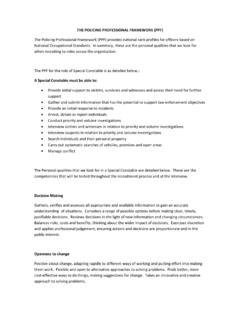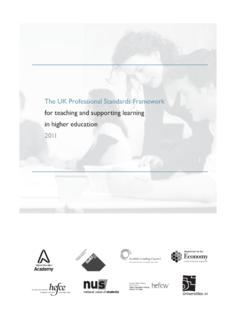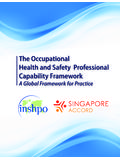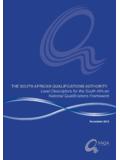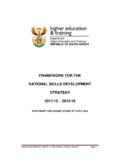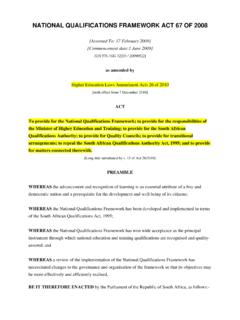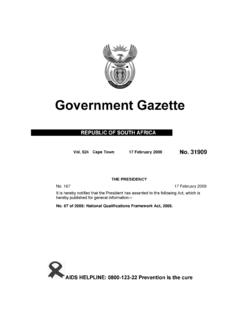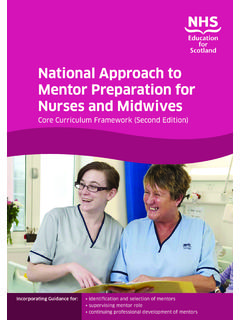Transcription of Mentoring and Coaching CPD Capacity Building …
1 national framework for Mentoring and CoachingPrinciples of Mentoring and Coaching Mentoring and Coaching : Core ConceptsSkills for Mentoring and CoachingMentoring and Coaching : A ComparisonContents: Mentoring and Coaching CPD Capacity Building Project Centre for the Use of Research and Evidence in Education (CUREE).The DfES recognises that the ways Mentoring and Coaching are used depend on the context. There is no intention to impose a uniform ten principles, based on evidence from research and consultation, are recommended to inform Mentoring and Coaching programmes inschools and to help increase the impact of continuing professional development on student learning. a learning conversationstructured professional dialogue, rooted in evidence from the professionallearner s practice, which articulates existing beliefs and practices to enablereflection on thema thoughtful relationshipdeveloping trust, attending respectfully and with sensitivity to the powerfulemotions involved in deep professional learninga learning agreementestablishing confidence about the boundaries of the relationship by agreeing andupholding ground rules that address imbalances in power and accountabilitycombining support from fellow professional learners and specialists collaborating with colleagues to sustain commitment to learning and relate newapproaches to everyday practice.
2 Seeking out specialist expertise to extend skillsand knowledge and to model good practicegrowing self directionan evolving process in which the learner takes increasing responsibility for their professional development as skills, knowledge and self awareness increasesetting challenging and personal goalsidentifying goals that build on what learners know and can do already, but couldnot yet achieve alone, whilst attending to both school and individual prioritiesunderstanding why different approaches workdeveloping understanding of the theory that underpins new practice so it can beinterpreted and adapted for different contextsacknowledging the benefits to the mentors and coachesrecognising and making use of the professional learning that mentors andcoaches gain from the opportunity to mentor or coachexperimenting and observingcreating a learning environment that supports risk-taking and innovation andencourages professional learners to seek out direct evidence from practiceusing resources effectivelymaking and using time and other resources creatively to protect and sustainlearning.
3 Action and reflection on a day to day basis Effective Mentoring and Coaching involves:Principles of Mentoring and coachingCentre for the Use of Research and Evidence in Education (CUREE). Mentoring is a structured, sustained process for supportingprofessional learners through significant career Coaching is a structured, sustained process forenabling the development of a specific aspect of a professionallearner s for Inductionis used to support professional learners onjoining a new school. For Newly Qualified Teachers this will alsoinclude induction into the profession as a for Progressionis used to support professional learnersto respond to the demands of the new role, to understand theresponsibilities it brings and the values it implies. Mentoring for Challengeis used to enable professional learners toaddress significant issues that may inhibit are experienced colleagues with knowledge of therequirements of the role.
4 They broker access to a range of increasinglyself-directed learning opportunities to support the development of thewhole person. Mentors are selected on the basis of appropriateknowledge of the needs and working context of the professional learner is someone tackling a new or particularlychallenging stage in her/his professional development who seeks outor is directed towards activities which promote and enhance effectivetransitions between professional roles, including:1. identifying learning goals and supporting progression 2. developing increasing learners control over their learning3. active listening4. modelling, observing, articulating and discussing practice to raise awareness5. shared learning experiences via observation or video 6.
5 Providing guidance, feedback and, when necessary, direction7. review and action planning8. assessing, appraising and accrediting practice9. brokering a range of supportMentoring usually takes placein the professional learner s school,in the work place and in quiet spaces that allow confidential teachers, especially trainee teachers, it also takes place in otherpeople s classrooms to enable observation for is usefulto a practitioner, at the beginning of her/hiscareer, at times of significant career change or in response to specific,significant Coaching is usedby schools and teachers to: review and refine established practice develop and extend teaching and learning repertoire introduce and experiment with alternative teaching and learning strategies support the development, across a department or a school, of a culture of openness mutual support for and critique of professional coaches are fellow professionals with knowledge andexpertise relevant to the goals of the professional learner.
6 They enableprofessional learners to take control of their own learning throughnon-judgemental questioning and support. The coach might be fromthe same institution or from elsewhere ( a university). Coaches areusually chosen by professional learners professional learner is someone tackling a specific teaching andlearning or leadership challenge who seeks out or is offered coachinginvolves activities which promote and enhancethe development of a specific aspect of teaching and learning orleadership practice, including:1. support to clarify learning goals2. reinforcing learners control over their learning3. active listening 4. modelling, observing, articulating and discussing practice to raise awareness5. shared learning experiences via observation or video 6.
7 Shared planning of learning and teaching or leadership, supported by questioning7. supported review and action planning8. reflection on and debriefing of shared experiencesSpecialist Coaching usually takes placein the professional learner sown work place - and in quiet spaces that allow confidential reflection- in order to facilitate observation of and reflection about her/his ownpractice and experiments with new Coaching is usefulto a practitioner, at any stage in her/hiscareer, in developing a deeper and more sophisticated understandingof existing and new (Co-) Coaching is a structured, sustained process between two or more professional learners toenable them to embed new knowledge and skills from specialistsources in day-to-day is usedby schools and teachers to support and sustainvoluntary, structured partnerships in which each participant relatesspecialist inputs to day-to-day practice.
8 It supports the development, across a department or a school, of aculture of openness mutual support for and critique ofprofessional practice. It also provides a good preparation for morespecialist Coaching skills and professional learners committed to reciprocal learningand to providing non-judgemental support to each other based onevidence from their own practice. Co-coaches seek out specialist inputto inform their Coaching . This may be provided by a third party viaa course, consultant, demonstration session or text based each take the role of coach and professional learner,usually alternately. Co- Coaching partners are mostly self activities which promote and enhance reflectivepractice including:1. developing mutual understanding of specific goals 2.
9 Sustaining learners control over their learning3. active listening4. observing, articulating and discussing practice to raise learning experiences via observation or video 6. shared planning of learning and teaching or leadership, supported by reciprocal questioning7. reciprocal action planning 8. shared analysis of learning experiences, evidence, research or alternative examples of practiceCo- Coaching takes placein the professional learners work place andin quiet spaces that allow confidential reflection. This will usuallyinvolve co-coaches observing each other s work and reflecting upontheir own and their co-coach s is usefulto a practitioner, at any stage in her/his career,following specialist inputs and whenever professional learners areseeking to review and enhance conceptsCentre for the Use of Research and Evidence in Education (CUREE)
10 Respond proactively to specialist expertiseto acquire and adapt new knowledge discuss practice and core conceptsprofessionally with the coach understand their own learning needsand goals and develop strategies that respond to these through dialogue with their specialist coach observe, analyse and reflectupon their own and the coach s practice and make this explicitSpecialist coaches1. relate sensitively to learnersand work through agreed processes to build trust and confidence2. model expertisein practice or through conversation3. facilitate access to researchand evidence to support the development of pedagogic practice4. tailor activities in partnershipwith the professional learner5. observe, analyse and reflectupon the professional learner s practice and make this explicit6.



